Who Wrote
Who Wrote The Bible? This Is What The Actual Historical Evidence Says
Set bated what religious tradition says, and discover who wrote the Bible according to the scholars who take examined the actual evidence.
Holy books have a reach that goes far beyond what well-nigh all works of literature can ever attain. Dissimilar, say, The Neat Gatsby, the Bible is a text upon which millions and millions of people accept based their entire lives.
That fact can be skilful or bad, and it's oftentimes been both over the many centuries throughout which Christians take been reading the Bible and Jews have been reading the Torah.
But given its immense reach and cultural influence, it's a bit surprising how petty nosotros really know most the Bible'due south origins. In other words, who wrote the Bible? Of all the mysteries surrounding the Bible, that i may be the most fascinating.

Wikimedia Commons A depiction of Paul the Apostle writing his epistles.
We're non completely ignorant, of grade. Some books of the Bible were written in the articulate light of history, and their authorship isn't terribly controversial. Other books can be reliably dated to a given menstruum by either internal clues — sort of the way no books written in the 1700s mention airplanes, for instance — and by their literary style, which develops over time.
Religious doctrine, of course, holds that God himself is the author of or at least the inspiration for the entirety of the Bible, which was transcribed by a series of humble vessels. Nearly the best that can be said for that notion is that if God really did "write" the Bible through a millennium-long sequence of diverse authors, he was certainly doing information technology the hard style.
Every bit for the bodily historical evidence regarding who wrote the Bible, that'due south a longer story.
Who Wrote The Bible: The Starting time Five Books
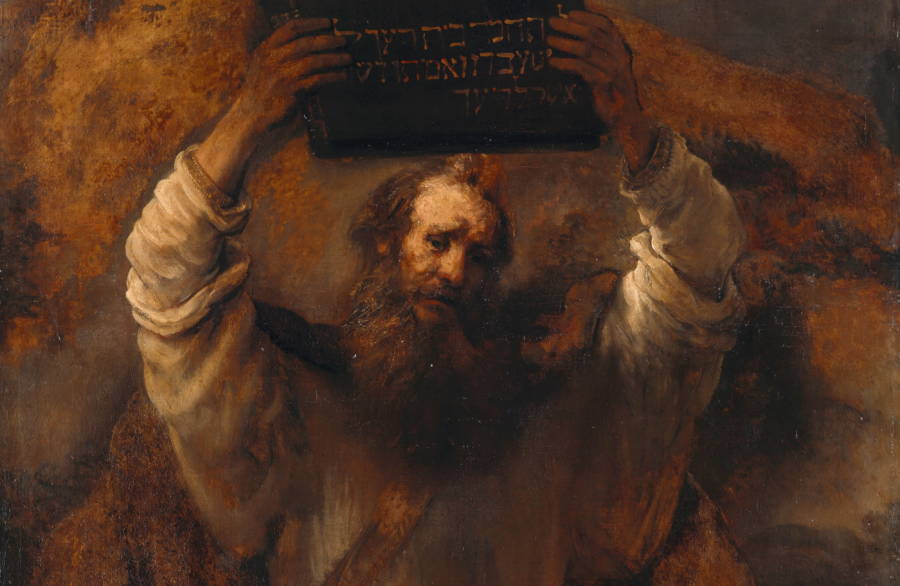
Wikimedia Commons Moses, as painted by Rembrandt.
Co-ordinate to both Jewish and Christian Dogma, the books of Genesis, Exodus, Leviticus, Numbers, and Deuteronomy (the outset five books of the Bible and the entirety of the Torah) were all written past Moses in most one,300 B.C. There are a few issues with this, however, such equally the lack of testify that Moses ever existed and the fact that the finish of Deuteronomy describes the "writer" dying and being buried.
Scholars have developed their own have on who wrote the Bible's commencement v books, mainly past using internal clues and writing fashion. But as English language speakers can roughly appointment a volume that uses a lot of "thee's" and "thousand's," Bible scholars can contrast the styles of these early books to create profiles of the unlike authors.
In each case, these writers are talked nearly as if they were a single person, but each author could but every bit easily be an entire school of people writing in a single style. These biblical "authors" include:
- East: "E" stands for Elohist, the name given to the author(due south) who referred to God as "Elohim." In add-on to a fair bit of Exodus and a little fleck of Numbers, the "E" author(due south) are believed to exist the ones who wrote the Bible's offset creation business relationship in Genesis affiliate one.
Interestingly, however, "Elohim" is plural, so chapter one originally stated that "Gods created the heavens and earth." Information technology'due south believed that this hearkens back to a time when proto-Judaism was polytheistic, though it was almost certainly a one-deity religion past the 900s B.C., when "E" would take lived.
- J: "J" is believed to be the second writer(s) of the kickoff five books (much of Genesis and some of Exodus), including the creation account in Genesis chapter two (the detailed one where Adam is created starting time and there'due south a serpent). This name comes from "Jahwe," the German translation of "YHWH" or "Yahweh," the name this writer used for God.
At one time, J was thought to have lived shut to the fourth dimension of East, only there's just no way that could exist true. Some of the literary devices and turns of phrase that J uses could only have been picked up sometime after 600 B.C., during the Jewish captivity in Babylon.
For example, "Eve" offset appears in J's text when she is fabricated from the rib of Adam. "Rib" is "ti" in Babylonian, and it's associated with the goddess Tiamat, the mother deity. A lot of Babylonian mythology and astrology (including the stuff well-nigh Lucifer, the Morn Star) snuck into the Bible in this way via the captivity.
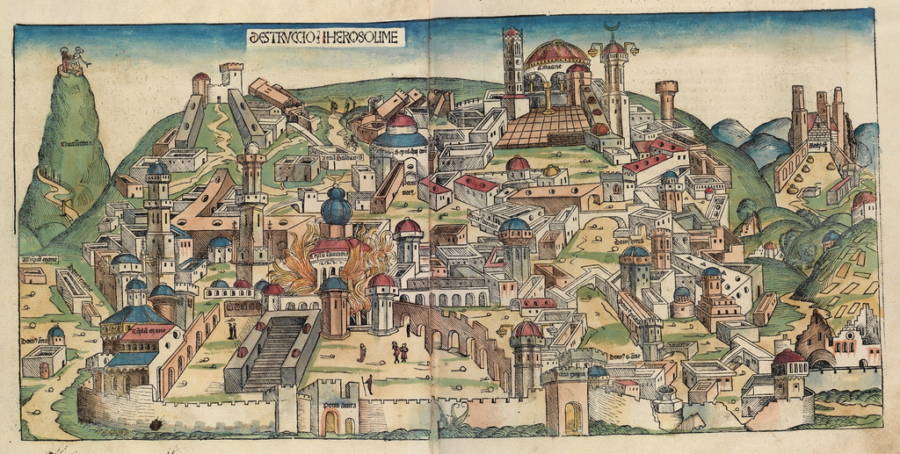
Wikimedia Commons A depiction of the devastation of Jerusalem nether Babylonian rule.
- P: "P" stands for "Priestly," and it almost certainly refers to a whole schoolhouse of writers living in and around Jerusalem in the late sixth century B.C., immediately after the Babylonian captivity ended. These writers were effectively reinventing their peoples' religion from fragmentary texts now lost.
P writers drafted nearly all of the dietary and other kosher laws, emphasized the holiness of the Sabbath, wrote endlessly about Moses' brother Aaron (the first priest in Jewish tradition) to the exclusion of Moses himself, and so on.
P seems to take written merely a few verses of Genesis and Exodus, but almost all of Leviticus and Numbers. P authors are distinguished from the other writers by their apply of quite a lot of Aramaic words, mostly borrowed into Hebrew. In addition, some of the rules attributed to P are known to take been common amid the Chaldeans of mod-24-hour interval Iraq, whom the Hebrews must have known during their exile in Babylon, suggesting that the P texts were written after that menstruum.
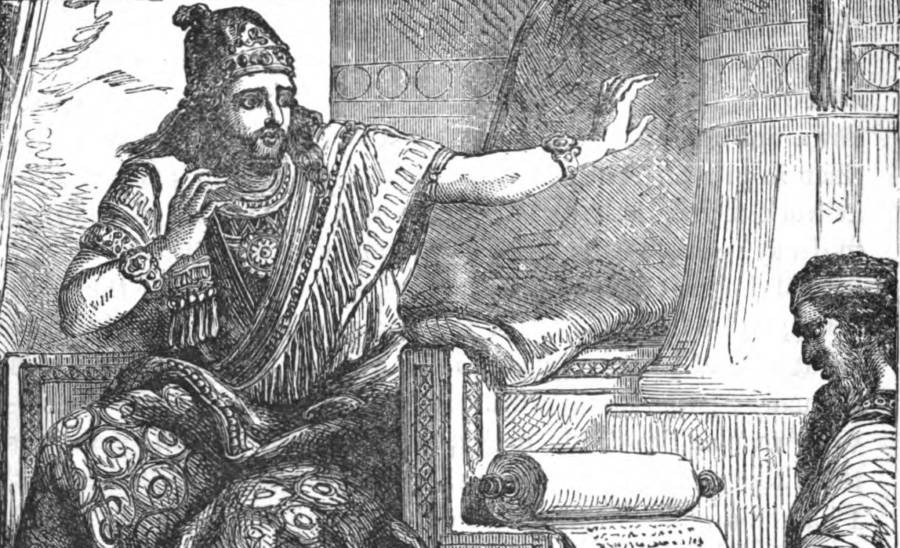
Wikimedia Commons King Josiah
- D: "D" is for "Deuteronomist," which ways: "guy who wrote Deuteronomy." D was also, like the other iv, originally attributed to Moses, but that'southward only possible if Moses liked to write in the tertiary person, could see the future, used language no one in his ain time would have used, and knew where his own tomb would be (clearly, Moses was not who wrote the Bible at all).
D likewise takes little asides to indicate but how much time has passed betwixt the events described and the time of his writing virtually them — "there were Canaanites in the land then," "Israel has non had such a great prophet [as Moses] down to this very solar day" — one time over again disproving whatsoever notions that Moses was the one who wrote the Bible in any way.
Deuteronomy was really written much later. The text first came to light in the tenth year of the reign of King Josiah of Judah, which was roughly 640 B.C. Josiah had inherited the throne from his father at age eight and ruled through the Prophet Jeremiah until he was of age.
Around 18, the Male monarch decided to seize full command of Judah, and so he dispatched Jeremiah to the Assyrians with a mission to fetch dwelling house the remaining diaspora Hebrews. And then, he ordered a renovation of the Temple of Solomon, where Deuteronomy was supposedly establish nether the floor — or and then Josiah's story goes.
Purporting to be a book past Moses himself, this text was a almost-perfect match for the cultural revolution that Josiah was leading at the time, suggesting that Josiah orchestrated this "discovery" to serve his ain political and cultural ends.
This is roughly the equivalent of President Trump fishing around in the Liberty Bong and challenge to find an amendment to the Constitution written by Thomas Jefferson that requires presidents to build edge walls — even though the supposed subpoena uses modern words such as "email" and "cellphone."
Histories
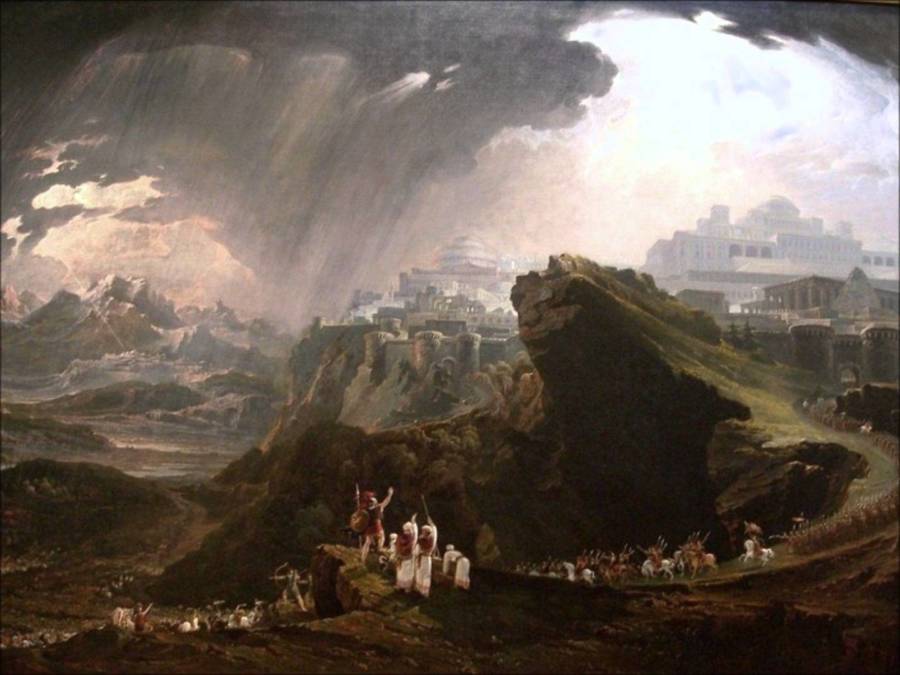
Wikimedia Commons A depiction of the story in which Joshua and Yahweh brand the sun stand however during battle at Gibeon.
The next answers to the question of who wrote the Bible come from the books of Joshua, Judges, Samuel, and Kings, mostly believed to have been written during the Babylonian captivity in the middle of the sixth century B.C. Traditionally believed to have been written past Joshua and Samuel themselves, they're at present oft lumped in with Deuteronomy due to their like style and language.
All the same, there is a substantial gap between the "discovery" of Deuteronomy nether Josiah in virtually 640 B.C. and the middle of the Babylonian captivity somewhere around 550 B.C. Notwithstanding, it's possible that some of the youngest priests who were alive in the time of Josiah were still alive when Babylon hauled off the whole state as captives.
Whether it was these priests of the Deuteronomy era or their successors that wrote Joshua, Judges, Samuel, and Kings, these texts represent a highly mythologized history of their newly dispossessed people thanks to the Babylonian captivity.
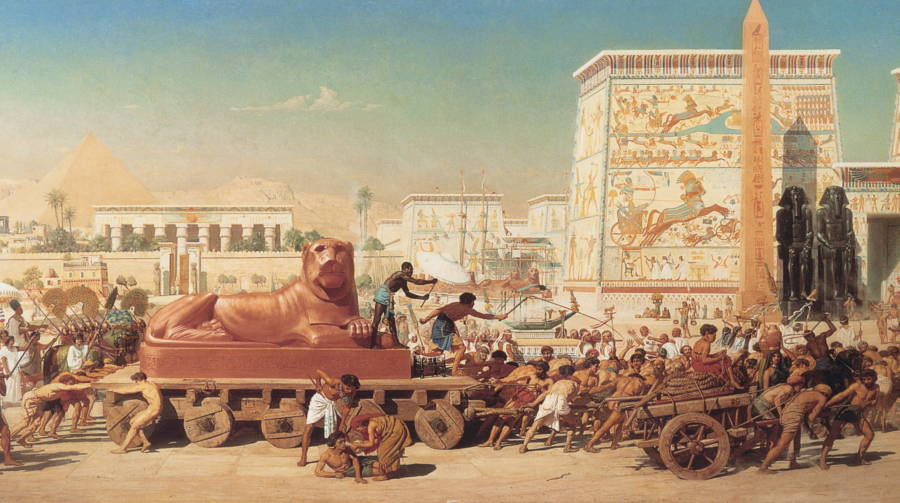
Wikimedia Commons A rendering of the Jews forced into labor during their time in Egypt.
This history opens with the Hebrews getting a commission from God to leave their Egyptian captivity (which probably resonated with the contemporary readers who had the Babylonian captivity on their minds) and utterly dominate the Holy Land.
The next section covers the age of the great prophets, who were believed to be in daily contact with God, and who routinely humiliated the Canaanites' deities with feats of strength and miracles.
Finally, the two books of Kings cover the "Golden Historic period" of Israel, under the kings Saul, David, and Solomon, centered around the tenth century B.C.
The intent of the authors hither isn't hard to parse: Throughout the books of Kings, the reader is assailed with endless warnings not to worship foreign gods, or to take up the strangers' ways — especially relevant for a people in the middle of the Babylonian captivity, freshly plunged into a foreign land and without a clear national identity of their ain.
Who Wrote The Bible: Prophets
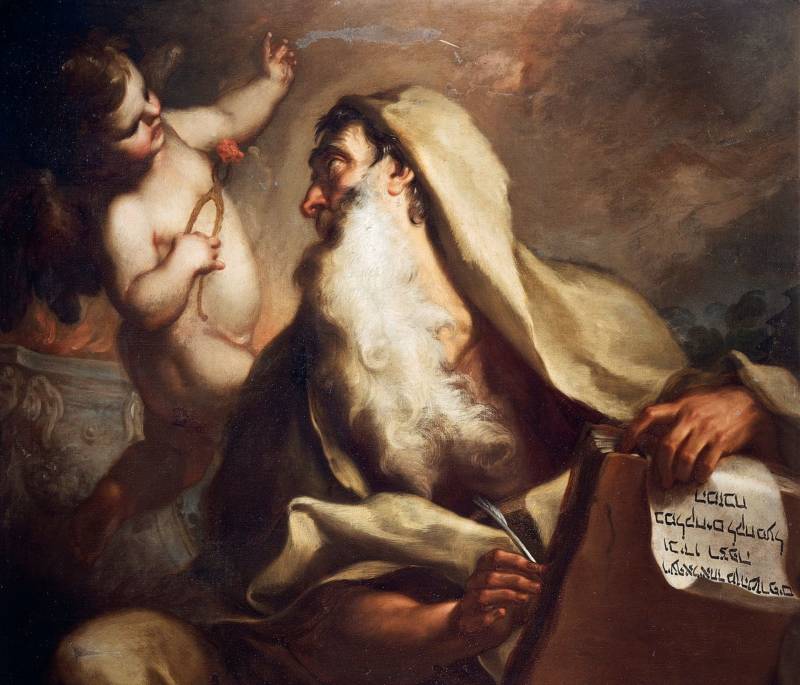
Wikimedia Commons The prophet Isaiah
The side by side texts to examine when investigating who wrote the Bible are those of the biblical prophets, an eclectic group who mostly traveled around the various Jewish communities to chide people and lay curses and sometimes preach sermons virtually everybody's shortcomings.
Some prophets lived mode back before the "Gold Age" while others did their piece of work during and after the Babylonian captivity. Later on, many of books of the Bible attributed to these prophets were largely written past others and were fictionalized to the level of Aesop'southward Fables by people living centuries after the events in the books were supposed to have happened, for example:
- Isaiah: Isaiah was one of the greater prophets of Israel, and the volume of the Bible attributed to him is agreed to have been written in basically three parts: early, middle, and late.
Early, or "proto-" Isaiah texts may have been written close to the fourth dimension when the man himself really lived, around the eighth century B.C., nigh the time when the Greeks were first writing down Homer'southward stories. These writings run from chapters 1 to 39, and they're all doom and judgment for sinful Israel.
When State of israel actually did fall with the Babylonian conquest and captivity, the works attributed to Isaiah were dusted off and expanded into what's now known as chapters 40-55 by the aforementioned people who wrote Deuteronomy and the historical texts. This part of the book is bluntly the ravings of an outraged patriot about how all the lousy, roughshod foreigners will someday exist made to pay for what they've washed to Israel. This section is where the terms "voice in the wilderness" and "swords into ploughshares" come up from.
Finally, the third part of the book of Isaiah was clearly written after the Babylonian captivity concluded in 539 B.C. when the invading Persians permitted the Jews to return home. It's not surprising so that his section of Isaiah is a burbling tribute to the Persian Cyrus the Great, who is identified as the Messiah himself for letting the Jews return to their home.
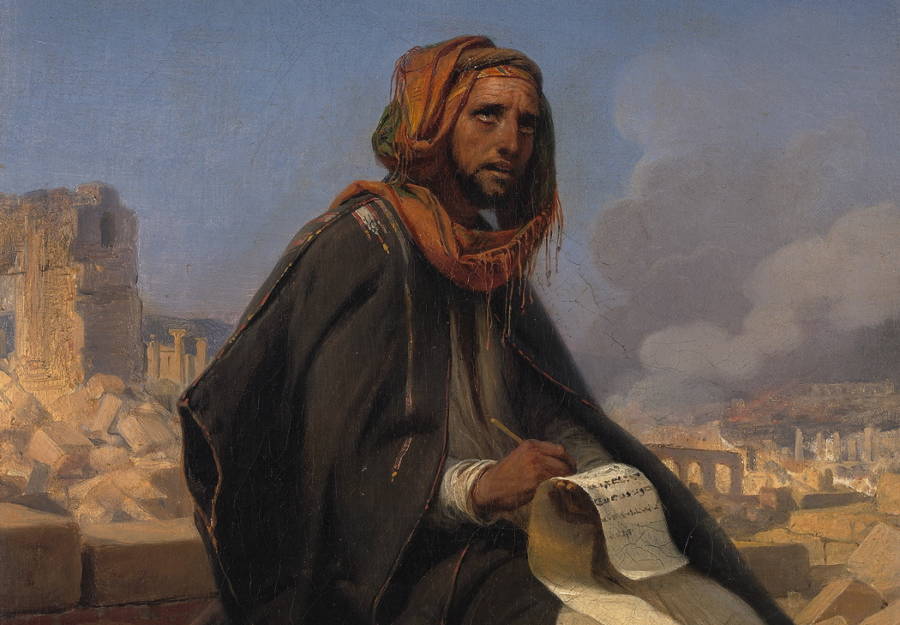
Wikimedia Eatables The prophet Jeremiah
- Jeremiah: Jeremiah lived a century or so later Isaiah, immediately before the Babylonian captivity. The authorship of his volume remains relatively unclear, even compared with other discussions equally to who wrote the Bible.
He may accept been one of the Deuteronomist writers, or he may take been one of the earliest "J" authors. His own book may have been written by him, or past a man named Baruch ben Neriah, whom he mentions every bit one of his scribes. Either style, the book of Jeremiah has a very similar style to Kings, and then it's possible that either Jeremiah or Baruch but wrote them all.
- Ezekiel: Ezekiel ben-Buzi was a priesthood member living in Babylon itself during the captivity.
There's no way he wrote the whole book of Ezekiel himself, given the stylistic differences from one part to the next, but he may have written some. His students/acolytes/junior assistants may take written the rest. These besides might take been the writers who survived Ezekiel to typhoon the P texts after the captivity.
Wisdom Literature
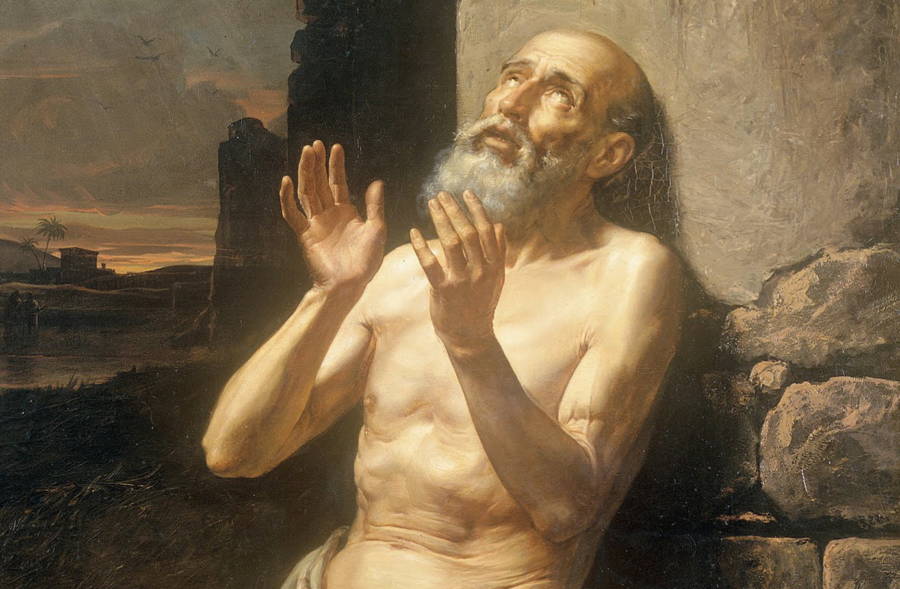
Wikimedia Commons Chore
The side by side section of the Bible — and the next investigation into who wrote the Bible — deals with what's known as the wisdom literature. These books are the finished product of nearly a one thousand years of development and heavy editing.
Unlike the histories, which are theoretically non-fiction accounts of stuff that happened, wisdom literature has been redacted over the centuries with an extremely casual attitude that has fabricated it hard to pin down whatever single volume to any single writer. Some patterns, however, have emerged:
- Job: The volume of Job is actually two scripts. In the middle, information technology's a very ancient epic poem, similar the E text. These 2 texts may exist the oldest writings in the Bible.
On either side of that epic poem in the middle of Task are much more contempo writings. It'southward every bit if Chaucer's The Canterbury Tales were to exist reissued today with an introduction and epilogue by Stephen Male monarch equally if the whole thing were one long text.
Section one of Job contains a very modern narrative of setup and exposition, which was typical of the Western tradition and indicates that this function was written after Alexander the Great swept over Judah in 332 B.C. The happy catastrophe of Job is also very much in this tradition.
Between these two sections, the list of misfortunes that Job endures, and his tumultuous confrontation with God, are written in a style that would take been around eight or ix centuries former when the beginning and ending were written.
- Psalms/Proverbs: Like Job, Psalms and Proverbs are likewise cobbled together from both older and newer sources. For example, some Psalms are written equally if at that place'southward a reigning king on the throne in Jerusalem, while others directly mention the Babylonian captivity, during which fourth dimension there was of course no king on the throne of Jerusalem. Proverbs was also continuously updated until about the mid-second century B.C.
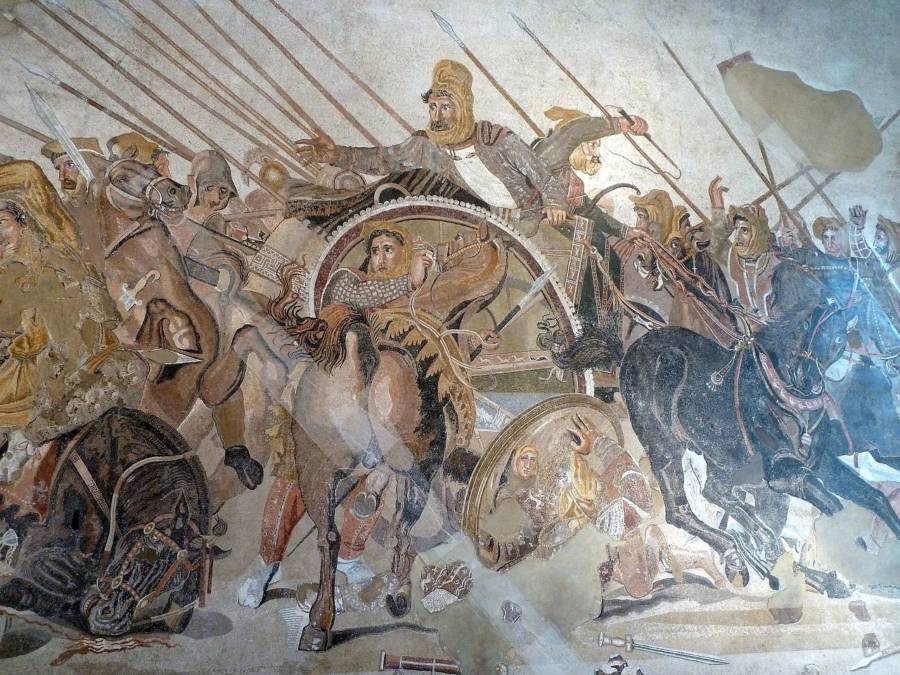
Wikimedia Commons A rendering of the Greeks taking Persia.
- Ptolemaic Menstruation: The Ptolemaic menstruation began with the Greek conquest of Persia in the late fourth century B.C. Before then, the Jewish people had been doing very well nether the Persians, and they were not happy virtually the Greek takeover.
Their main objection seems to accept been cultural: Within a few decades of the conquest, Jewish men were flagrantly adopting Greek culture past dressing in togas and drinking wine in public places. Women were even education Greek to their children and donations were way downwards at temple.
The writings from this fourth dimension are of a high technical quality, partly thanks to the hated Greek influence, but they also tend to be melancholy, also due to the hated Greek influence. Books from this menstruum include Ruth, Esther, Lamentations, Ezra, Nehemiah, Lamentations, and Ecclesiastes.
Who Wrote The Bible: The New Attestation
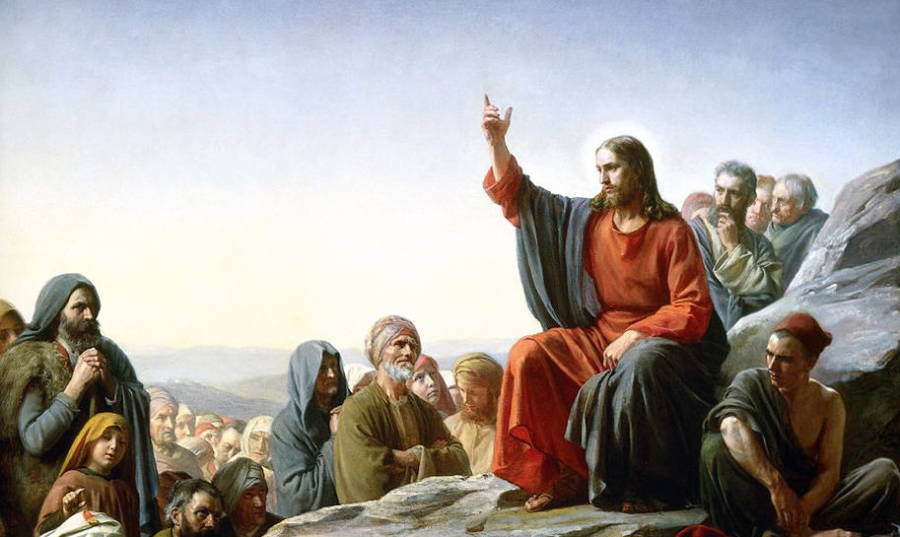
Wikimedia Eatables A depiction of Jesus delivering the Sermon on the Mount.
Finally, the question of who wrote the Bible turns to the texts dealing with Jesus and beyond.
In the second century B.C. with the Greeks still in power, Jerusalem was run by fully Hellenized kings who considered it their mission to erase Jewish identity with total assimilation.
To that end, King Antiochus Epiphanes had a Greek gymnasium built across the street from the 2nd Temple and fabricated it a legal requirement for Jerusalem's men to visit information technology at least once. The thought of stripping nude in a public identify blew the minds of Jerusalem's faithful Jews, and they rose in encarmine revolt to terminate it.
In fourth dimension, Hellenistic rule fell apart in the area and was replaced by the Romans. It was during this time, early in the offset century A.D., that 1 of the Jews from Nazareth inspired a new organized religion, one that saw itself equally a continuation of Jewish tradition, but with scriptures of its own:
- Gospels: The four Gospels in the Male monarch James Bible — Matthew, Marker, Luke, and John — tell the story of Jesus' life and death (and what came after that). These books are named later on Jesus' apostles, although these books' actual authors may have just been using those names for street cred.
The first Gospel to be written may have been Marker, which then inspired Matthew and Luke (John differs from the others). Alternatively, all iii may have been based on a now-lost older book known to scholars equally Q. Whatever the example, evidence suggests that Acts seems to take been written at the same time (the finish of the first century A.D.) and by the same author every bit Mark.

Wikimedia Commons Paul the Apostle
- Epistles: The Epistles are a series of letters, written to various early congregations in the eastern Mediterranean, past a single private. Saul of Tarsus famously converted afterward an encounter with Jesus on the road to Damascus, later on which he inverse his name to Paul and became the unmarried most enthusiastic missionary of the new religion. Along the manner to his eventual martyrdom, Paul wrote Epistles of James, Peter, Johns, and Jude.
- Apocalypse: The book of Revelation has traditionally been attributed to the Apostle John.
Unlike the other traditional attributions, this 1 wasn't very far off in terms of actual historical actuality, though this volume was written a petty late for someone who claimed to know Jesus personally. John, of Revelation fame, seems to have been a converted Jew who wrote his vision of the Terminate Times on the Greek island of Patmos about 100 years after Jesus' death.
While the writings attributed to John actually practice show some congruity betwixt who wrote the Bible according to tradition and who wrote the Bible according to historical show, the question of Biblical authorship remains thorny, complex, and contested.
After this await at who wrote the Bible, read up on some of the most unusual religious rituals proficient around the world. And so, accept a look at some of the strangest things that Scientologists actually believe.
Source: https://allthatsinteresting.com/who-wrote-the-bible
0 Response to "Who Wrote"
Post a Comment